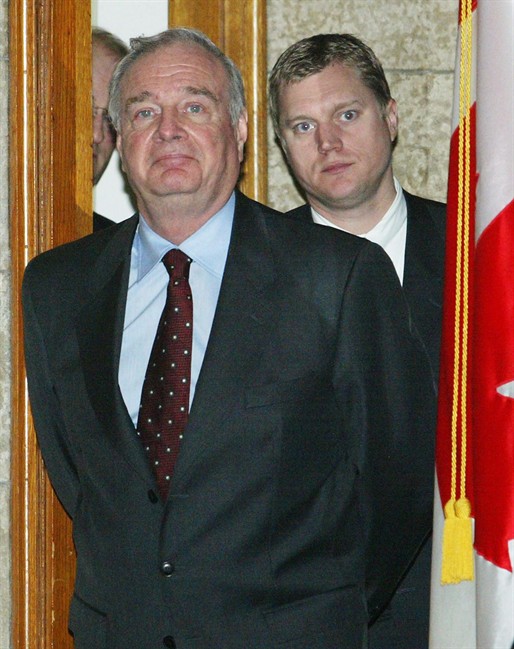MONTREAL – They provide the words that keep politicians talking, carry them through crisis, define their legacy.

Governments can live or die depending on the heights of their rhetoric, and often have. Indeed, speechwriters are an invisible but potent force in Canadian politics.
But what happens when they find their words beginning to fall flat, when they no longer believe what they’ve been asked to justify?
What happens when the speechwriter hates the speech?
Quebec Premier Jean Charest’s longtime speechwriter, Patrice Servant, found himself in that position recently. What Servant did next has prompted both criticism and praise from alumni of the profession.
For months Servant had articulated Charest’s steadfast refusal to hold a public inquiry into the corruption scandal gripping the province. He reached his breaking point late last month, and resigned after nearly 10 years in Charest’s inner circle.
Servant told the CBC’s French-language service last week that he was “ill-at-ease relaying the government’s position, which is not in the interests of its citizens.”
“It had become a matter of conscience,” he added.
It was a rare public rebuke to Charest from a close aide. It was also an uncommon event in Canadian politics: an example of a public rift between a politician and the writer paid to put words in his mouth.
Three speechwriters for former prime ministers Paul Martin and Brian Mulroney, contacted by The Canadian Press, conceded internal disagreements are normal.
But none of them would discuss their own disagreements with former bosses in any detail. They called it an unwritten rule of the trade to keep those differences out of the public view.
Servant’s decision did, however, elicit a note of solidarity from one fellow member of the speechwriters’ brotherhood.

Get daily National news
Jean-Francois Lisee, who wrote for Quebec premiers Jacques Parizeau and Lucien Bouchard, posted an open letter to Servant on his blog, saying he understood what he was going through.
Lisee, who is now a political analyst, even offers the tale of his own resignation.
By 1999, he had begun to disagree with Bouchard’s go-slow approach to achieving Quebec independence and was convinced the strategy was doomed to fail.
But he kept writing his speeches, until one day in April that year. Lisee recalls standing at the back of a room where the premier was giving one of his speeches, and literally feeling sick.
“It was impossible for me to write another text like that one,” he recalled. “I knew at that exact moment that I had to leave.”
He said the process exacted a heavy personal toll. Lisee described “an osmosis” between a public figure and his scribe: “One enters the spirit of the other, and over time borrows the ideas, images, even the tics of his partner.”
Which is why the “divorce” can be so psychologically taxing.
“There must have been a moment when you were physically sick,” he tells Servant in the letter. “When the professional obligation to act against your conscience overwhelms your brain to attack your nervous system.”
Other colleagues said they could relate to Servant’s predicament – but suggested he violated an unwritten professional code by calling attention to himself.
Former Paul Martin speechwriter Scott Reid said there are a number of fundamental principles within the business, the first of which is: “You do not exist.”
“The speech does not belong to the writer – you can’t be confused about that – and if you are confused about that, you’re in the wrong business,” said Reid, who now runs his own speechwriting firm.
For Reid, it is entirely reasonable for a speechwriter to step down over a major policy disagreement. But professionalism also requires those reasons to be kept private.
“My quarrel with Mr. Charest’s speechwriter is not that he quit,” Reid said. “It is that he quit and then decided to tell people that he quit, and why.”
Crafting an important speech can be a long process, involving input from many different sources. Disagreement, speechwriters say, is natural.
“It can be frustrating. I won some, I lost some,” said Robert Asselin, who wrote French speeches for Martin as well as Stephane Dion and Michael Ignatieff.
But airing those disagreements in public represents a “huge breach of confidence,” Asselin added.
“The problem for Charest now is, if he can’t trust his speechwriter, who can he trust?” Asselin said. “For most politicians, their last line of defence is their staff. They need to be loyal.”
L. Ian MacDonald, who spent four years as Brian Mulroney’s chief speechwriter, agreed that it is the scribe’s lot to remain out of the media spotlight.
“When the staff start making policy, it’s a bad sign,” he said.
MacDonald added that he never went through the experience described by Lisee, or Servant for that matter. For the most part, he and Mulroney were on the same page, which made a demanding job much easier.
What disagreements he did have with his boss were raised with, “the greatest of care and discretion,” he said, laughing.
But MacDonald acknowledged that the demands of speechwriting – a “burn-out job” – eventually began to wear on him.
He said it wasn’t controversy that pushed him out the door. After handing over his best material for so long, he said, he simply wanted to write for himself again.
“I had done it for four years, and it was time to leave,” said MacDonald, who now writes a newspaper column and edits Policy Options magazine.
“I wanted to get my own voice back, somehow.”







Comments
Want to discuss? Please read our Commenting Policy first.